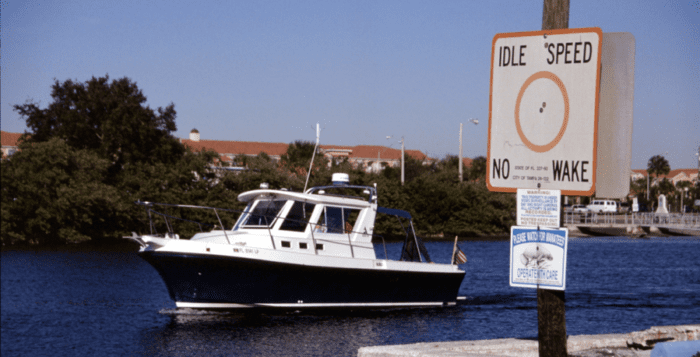Summer boating safety tips from the Coast Guard Auxiliary
By Herb Herman
Boating safely is more than common sense. While you don’t have to memorize the marine Rules of the Road to be a safe boater, a careful reading would be beneficial for every boater. Pass oncoming boats port-to-port, always have a look out, have a marine radio available and preferably tuned to channel 16. Use charts so you don’t go aground. Reduce speed in harbors and in tight quarters. Know what the buoys and other channel markers mean, and, above all, be mindful of your environment. The Coast Guard calls this “situational awareness,” a mindset that is useful anywhere and at anytime doing anything, though it’s especially important out on the water.
Old salts, the veteran hands of boats and sailing, are not born that way — they learn by experience. There is, however, a better way: take a boating safety course. These days, thankfully, boating safety courses are required in most states. These courses are given by government and private parties. The Coast Guard Auxiliary and the Power Squadron give excellent programs that are tried and true and can get a dedicated novice up to speed in a few hours. The problem is getting boaters to sign up for these courses. We have all kinds of excuses, ranging from limited time in our busy lives to talk of, “boating is like driving, all you have to do is steer the boat.”
But boating is not so simple an activity. Steering a boat is nothing like driving a car. In driving, does the road flow in a direction different from the one you’re going? When’s the last time you’ve seen a road center lines on the water? Does the wind usually effect your driving? Put simply, boating is a unique activity and one that takes some learning to be proficient at.
Granted, there is no better teacher than experience. However, most of us didn’t learn how to drive by getting behind the wheel and driving. We usually took driver training course. What, then, makes us think that handling a boat doesn’t require training? One full day or a couple of afternoon training sessions can add immeasurably to your enjoyment on the water and may even add years to your life.
A central feature of the Coast Guard’s safety mantra is the Personal Floatation Device, i.e., life jackets. It is estimated that life jackets could have saved the lives of over 80 percent of boating fatality victims. Accidents can and do happen with terrifying speed on the water. There’s rarely time to reach stowed life jackets. These days floatation aids can be comfortable, so there is no excuse for not wearing one, except for, perhaps, your vanity. Doesn’t look good? How does a drowning victim look after being pulled from the water?
In fact, life jackets are required for jet skiers and paddle boaters. There are other requirements for these activities, all based on common sense. But common sense is sometimes lacking on the water. Observed in Mount Sinai Harbor last summer, a young woman on a stand-up paddler with a young child sitting there, neither of whom had on life jackets. And there are kayakers in Port Jefferson Harbor, silently gliding in and out of the mooring field while an equally mindless power boater heedlessly plows his way between the mooring buoys. These situations are disasters waiting to happen.
We have every opportunity to make this summer’s boating a safe one. Safe boating classes are readily available. Make it a family affair. Make your dream on the water come true and not end tragically. Have the family don their vests and tell them they look great. Don’t boat under the influence. Avoid speeding when it is clearly dangerous. Adhere to regulations that are posted for No Wake, etc. Make certain that your mechanical systems are functioning properly. Be prepared for someone falling overboard or some other accident. And above all, have a Vessel Safety Examination by the Coast Guard Auxiliary. Contact the Port Jefferson Flotilla to arrange an inspection: email: [email protected] or phone: 631-938-1705.
Have a great family summer on the water!
Herb Herman is the flotilla staff officer for public affairs, Port Jefferson Auxiliary Flotilla 14-22-06.







